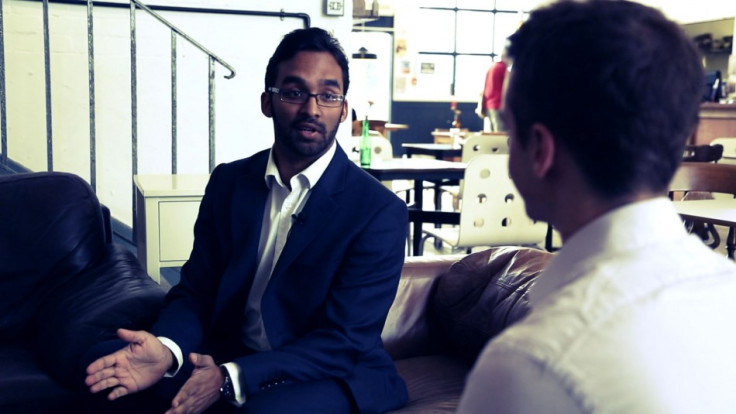Inside Tech City: Croydon Tech City [VIDEO]
In episode five of Inside Tech City, Alistair Charlton visits Croydon Tech City to speak with co-founder Nigel Dias about how his project proves tech cities and startup hubs can be developed anywhere.

Thrust into the media spotlight during the summer riots of 2011, Croydon perhaps isn't the first place entrepreneurs would consider setting up a new business if east London's not for them - but Nigel Dias and Jonny Rose set out to reverse this belief, and prove Tech Cities can be established anywhere.
A non-for-profit movement set up in early 2013 to make Croydon an attractive home for technical and digital startups, Croydon Tech City (CTC) calls itself the Silicon Valley of South London and, based at Matthew's Yard - a cafe/bar cum workspace - offers very young companies somewhere to work, and mentorship from those who have been there before.
I spoke to co-founder and head of partnerships and growth strategy, Nigel Dias, to find out where the idea came from and how it compares itself to the government-run Tech City of east London.
Key ingredients
"It all started with the theory that 'why does Tech City have to be in east London?' - we've got all the key ingredients in Croydon itself. It's one of the most populated boroughs in London with a high amount of talent typically that jumps on trains and runs to the city, does its work and comes back. It was all about proving that, you know what, we've got the people that you need to do this here, we've got all the elements so let's put that together and make Croydon Tech City."
Croydon may not have Google Campus and the recognisable Old Street roundabout, but Dias and his partners have been able to create a functioning startup cluster and shared workspace with almost no funding or government aide.
"There was no funding from the government or anything like that," Dias said. "It was people in the community - myself, Jonny Rose, people like that - coming together and saying 'hey we can actually do this here'. Then over the last nine months we have grown purely off that community action. People provided their time to us just because they wanted to support the area."
Dias believes that being tied to the government would have hindered the project's agility as it grew.
"It almost makes sense to have kept the government at arm's reach because I feel like [although] it wouldn't have hindered so much, we could be more agile and more free with what we do."
But going forward, Dias claims that "inevitably there is a responsibility in the government to support activities like ourselves. So far we've been lucky in that Croydon council has let us get on with what we're doing."

Bootstrapped
Without outside funding, Dias admits that the entire Croydon Tech City project has been heavily bootstrapped, and was only made possible by cash injections from his and Rose's own pockets.
"To date, like a tech startup, we've bootstrapped our way and most of the costs we have incurred, we have paid for out of our own pockets."
Not just money, but the project's partners have invested time too - an admirable achievement, given they both already have full-time jobs, with Dias running his own company.
Regarding how he manages Croydon Tech City and running another company, Dias said: "I will not lie, CTC does take up quite a lot of our time."
But the community spirit encouraged by the project and by Croydon as a whole has meant CTC has benefitted from members of the technology community offering their free time to help.
Dias estimates more than 60 people have come forward to give up their time, each offering between five and 10 hours of knowhow and expertise to help get the project off the ground.
Education
Dias is a firm believer in being able to create tech cities anywhere, and that all it needs is an understanding from local communities that entrepreneurialism is a valid alternative to regular employment.
"In an era when there aren't as many people employed in traditional careers, tech cities and startups are an opportunity for people to go out and proactively seek their own employment with the hope of one day being the next Facebook...as long as you've got people who have the skills and inspiration, and as long as you can educate people on how to create startups, then you can do that anywhere, and that's what Croydon Tech City proves."

Expectations
CTC also proves that there is more to Croydon that some people might think, and more than out-of-date stereotypes suggest.
"It's so counterintuitive, Dias says. "People just don't expect things like this to be popping out of Croydon. This is where there's Croydon Facelift jokes, there's stabbing jokes, all those type of things - we're here proving that Croydon is actually about the talent and opportunity in the borough and that things are changing for the better.
"Croydon gets its [negative] publicity and what we're trying to do is show people that they can come here for tech."
Dias continues to explain that CTC isn't the only community-led project in Croydon, and that establishing such a venture isn't all about earning money from it.
"This is just one of many positive things going on in Croydon and they aren't all for money. I don't know if you can claim it was the riots that catalyzed and kicked off a lot of them, but there's so much stuff if you look around Croydon which is people saying 'we don't need someone else to do this for us, we don't need the government to come and mass-fund this type of thing'.
"With the right mentality and the right community and support - and the right strategy as well I suppose, you've got to have a bit of nouse to do this type of thing - there is no reason why you can't just make these things work."
Next week, in the final episode of the series, I will be speaking to Pru Ashby, who is head of partnerships for Tech City.
Read more:
- Episode 1: Huddle
- Episode 2: Google Campus
- Episode 3: Mind Candy
- Episode 4: Hailo
© Copyright IBTimes 2025. All rights reserved.






















